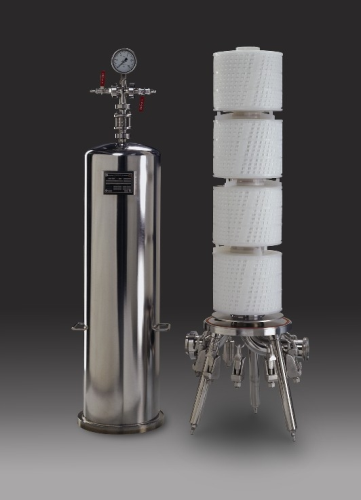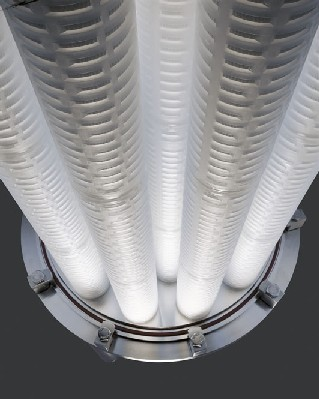

Introduction
Due to the increased customer demand for bottled beverages, implementation of a final filtration step prior to bottling has become state of the art in most beverage applications.The filtration step upstream of the filling machine consists of a prefilter (depth filter) and a final membrane filter.
The filtration step during production of the beverages (e.g. wine, beer, water), has to assure that the beverage is free of product-spoiling micro-organisms to guarantee reliable quality for the customer. As well as this, filtration costs need to be reasonable and the filtration process has to be performed without affecting the taste or the aroma of the beverage itself.
Applications (wine, beer and water)
Several filtration steps are performed during the beverage production process. For example, prefiltration with crossflow systems in the preparation of wine removes particles and microorganisms. Air or carbon dioxide used to prepare the beverage is membrane-filtered as well.
To prevent a contamination of the bottled beverage a final filtration step prior to bottling is installed between the filling tank (buffer tank) and the bottling machine. In bottling plants, both manually operated and fully automated filtration systems are encountered. Most systems are equipped with two filter housings installed in a series. The first filter housing is equipped with filter cartridges for the prefiltration step and the second housing contains membrane filter cartridges for the final filtration step prior to bottling.
The filter housings are connected to the supplies for water, steam, gas and the CIP solution. These media are used for the cleaning and sterilization process of the filter elements, housings and stainless steel pipe work. The pressure conditions across the filtration system are monitored by pressure gauges. For the regularly performed integrity test the final filter housing is equipped with the required connection valves.
Fully automated filtration systems are programmed with process control software which allow regular cleaning and sterilization cycles to be performed. Process data and test results of the integrity test are stored in database systems. The process data can be regularly reviewed in order to monitor the consistency of the process and for further process optimization to reduce filtration costs.
Prefiltration and membrane filtration
The differentiation between a prefilter and a membrane filter is based on the filter media used. A prefilter consists of a three-dimensional network of non-woven fleece material with a relatively non-directional structure. The retention of particles and microorganisms is mainly achieved in the “depth” of the filter matrix by mechanical retention and adsorption. The main advantage of these filters is the high particle holding capacity. The particle retention capability is influenced by the diameter of the fibres and the thickness of the filter structure.
Membrane filters are predominately used in the final filtration step because they assure the most reliable retention of particles and specific beverage-spoiling microorganisms. Retention mainly takes place on the membrane surface by the sieving affect. Particles and microorganisms larger than the actual pore size of the membrane are effectively removed. The selection of the right pore size of the membrane is based on the potential beverage spoiling microorganism present and the size of the particles which need to be retained.
To install an economic filtration system and to optimize the total filtration process, the optimal combination of a prefilter and a final membrane filter has to be selected. The prefilter must protect the final membrane filter effectively to guarantee an extended service life for the complete filtration system and thereby reduce the filtration costs significantly.
Membranes and fleece media
The service life cycle of filter cartridges used in beverage production plants ranges from several months up to one year, depending on the process conditions. Many sterilization cycles (hot water or steam) are performed during the period of use. Long-term use and stressful process conditions are variables to be considered during the development process of new filter cartridges. Another aspect to be considered is the cleaning and disinfecting agents used for CIP.
Usually, non-woven polypropylene fleece or glass fibre fleece is used for prefilters. The combination of coarser and finer fleece has a strong impact on particle retention and the service life of the filter cartridge.
Polypropylene features a broad chemical compatibility. Caustic and acid can be used for the CIP process in the pH range from 1 to 14. In the beverage industry sterilization processes are commonly performed with hot water (> 80 °C) or steam (105 °C – 110 °C). The complete filter cartridge construction (outer cage, inner core, adapter) is made of polypropylene to withstand these harsh process conditions. Polypropylene fleece shows the highest performance compared to other polymer fleece (polyester), because the fleece structure of the polypropylene is able to withstand long-term thermal exposure in comparison to other fleece materials, e.g. polyester.
Glass fibre fleece compared to polypropylene fleece provides an additional adsorption effect in specific wine applications. Finer particle retention in combination with a higher dirt holding capacity is the main advantages of this fleece material.
Sartorius have developed Jumbo Star, a unique prefilter cartridge designed especially for applications with extremely high flow rates. A new pleating technology guarantees an extended filter surface area. This new development assures a long service life and the highest degree of protection of the final membrane filter in the prefiltration step of multiple beverages prior to filling.
Membranes are characterized according to their pore size (e.g. 0.2 μm, 0.45 μm or 0.65 μm). The type of beverage spoiling microorganisms present in the beverage to be bottled determines the pore size of the membrane filter to be selected for the filling step.
In beverage applications mainly membranes made of PESU (Polyethersulfone) or CA (Cellulose Acetate) are used. Long term stability for pressure pulsations and high flow rates, the two main considerations when looking to reduce filtration costs, are achieved by new membrane developments. Improved membrane structures, developed according to the different application requirements, assure an improved service life performance.
The key features of PESU membranes, which are used for Vinosart PS, Sartocool PS and Aquasart PS final filter cartridges is the chemical compatibility for caustic and acetous CIP solutions in the pH range 1 to 14. Caustic, available in every plant, guarantees an effective regeneration process. The service life performance of the filter elements is extended by repeated cleaning which results in lowest filtration costs.
For sensitive beverage (near water drinks) application, where lowest adsorption of ingredients is required, cellulose acetate membranes show the highest filtration performance. In bottled water applications filter cartridges with a cellulose acetate membrane yield extremely high performance which results in extended usage.
Filter qualification
Membrane filter elements are individually integrity tested during the manufacturing process to guarantee highest product quality and reliable process conditions for the user and uncompromised safety for the consumer of the beverage.
For filter cartridges, standard test procedures are defined to check for:
- • flow rate; • long-term mechanical stability;
• thermal stability;
• chemical compatibility;and
• service life.
Prefilters are typically tested for particle retention and dirt holding capacity. Furthermore the protection efficiency of the prefilter for the final membrane filter is tested under application conditions.
The test is performed using a standard test solution, which consists of particles, colloids and proteins as a worst case challenge fluid. Different fleece material combinations are evaluated for optimal protection of the final filter. The finally selected fleece material combination assures best protection of the final membrane in a given application.
The most important aspect of the qualification of membrane filter cartridges is their capability to removal microorganisms reliably from the fluid stream. These tests are typically performed using beverage spoiling microorganisms which are present in the different beverages to be filtered. For example, membrane filters used in breweries are tested with Saccharomyces Cerevisiae and Pediococcus Damnosus, known as two typical species with need to be effectively removed from beer.
Integrity Test
To guarantee the functionality of the membrane filters under process conditions even after multiple steaming and cleaning cycles and to reliably prevent microbiological contamination, membrane filters are regularly tested for integrity.
The integrity test has to be performed after the sterilization process of the filter cartridges and the system prior to the start of the filling process to guarantee that the complete production lot is free of beverage-spoiling micro-organisms.
Summary
For the final filtration step of beverages prior to bottling two main aspects have to be taken into consideration.
- • The bottled beverage must be free of product-spoiling microorganisms.
This important quality parameter of the beverage is achieved by using membrane filter cartridges with appropriately selected retention performance to remove reliably the product spoiling microorganisms present.
- • Regularly performed cleaning and disinfection cycles
Cleaning cycles of the whole filling system including the filtration equipment are a major prerequisite for a safe and reliable process. The functionality of the filtration systems in place for bottling must be regularly verified by performing filter integrity tests.
Based on the different application needs the selection of the optimal combination of prefilters and final filters assures the most economic process solution.




